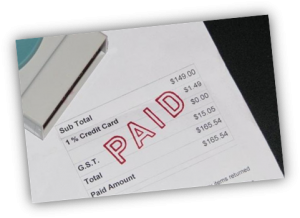It goes without saying that a business needs cash flow to keep operating.
If too many customers forget, delay or refuse to pay, your business could end up in serious trouble! If you’re having trouble, you need to act now and look to make some changes, and keep them in place and on task.
Debt collection is an aspect of cash flow management where a lot of businesses under perform. However, it doesn’t have to be difficult. If you have the right person for the job and develop good work processes, the process of debt collection can be made easier and it will have a positive effect on your cash flow and business morale.
Employing the right person
Admittedly, the term ‘debt collector’ can have a negative connotation and feelings. It conjures up images of harassment, intimidation and fear! Not only that, many business owners might assume that because collecting money comes under the umbrella of finance or accounts, then their bookkeeper should be an expert and enjoy chasing up outstanding bills! That’s not always the case.
The responsibility of collecting money (known as ‘accounts receivable’) is likely to be suited to someone who is good with people – friendly and confident. They should be well-organised, have good time management skills and be able to keep handy records of customers’ habits and tendencies when it comes to paying their bills and how to handle them to keep them in check.
Running the reports and making the call is the hardest part, but using tools like Xero can help make this process simpler or easier or elevate it all together with subscription models and direct debits.
Measuring & Monitoring Effectiveness
Generating a report showing outstanding debts broken down into 30, 60 and 90 days columns won’t show the average accounts receivable days, that is, how many days it takes on average for customers to pay their invoices. Businesses operating on payment terms of 30 days may not realise that in reality customers take much longer on average to pay their bills. Be sure that if you don’t run an account for clients, not to send statements, only send overdue invoices, as when you send a statement it can very well show the customer they can pay at 90days.
Working out the average accounts receivable days provides a useful indicator for your debt collector to measure their effectiveness, and can be calculated using this formula:
For example, a business might have generated revenue of $95,000 for the first quarter of the year. The outstanding invoices, or accounts receivable, on record for that period total $65,000. Therefore, the days in accounts receivable are calculated as follows:
$65,000/$95,000 x 90 days =62 Days
Monitoring this indicator from one quarter to the next, or over a 12 month period, will show whether debt collection efforts are improving, remaining the same or ineffective. These results are helpful both to the person responsible for collecting debts and the business owner. Knowing your business is important, but measuring and tracking current trend and customer tendencies can help ensure cashflow remains positive and continuous.
One of the best ways to keep the cash flowing is to manage your Accounts Receivable with meticulous regularity.
Tools and Tracking
With the right tools for the job will always make life easier, even the right paper cash book well organised can have the right impact on your Cash Flow. We now live with so much technology at our finger tips, we need to ensure we’re using it to our advantage. Several Clients have switched to Online Accounting Systems and found the impact on their business and cash flow to be amazing for their business, but even more so getting back their weekend.
Xero allows you set up invoice reminders to re-send an invoice if it has not been paid after a certain amount of defined time, even multiple times in a row. This will help get you paid more often and reduce the number of times a customer may need to be called or for you or the team to sned out reminders manually.
Getting paid should be easy and not a chore for businesses, if you’re looking for an easier solution, call your Business Edge Accountant for a better business strategy.
What Now?
- Designate a well-organised and amiable employee to be in charge of debt collecting. Together develop a protocol for collecting debts and use the indicator to measure progress and performance.
- Schedule time in your calendar to review outstanding debts regularly!
Contact Business Edge Accountants today on 02 6041 1687 or assistance with this Action Plan!


